5 best ways you can sell your car
Are you ready to sell your car but unsure where to start? Whether you're after speed, maximum value, convenience, or safety, your best option depends on what matters most to you.
To make things easier, we’ve outlined the 5 best ways to sell your car based on your priorities. Looking for a quick sale? Prioritising profit? Want a hassle-free or safe selling process? We’ve got you covered.
Each method is broken down by time, effort, pros, and cons, with a side-by-side comparison to guide your decision.
Quick links:
- 1. Selling your car privately
- 2. Selling your car to a dealership
- 3. Selling your car at auction
- 4. Selling your car for scrap
- 5. Selling to webuyanycar
- What is the best car selling method for profit?
- What is the fastest car selling method?
- What is the safest car selling method?
- Car selling methods compared: Which is best for me?
Get a free valuation
1. Selling your car privately
If you want to get the highest possible price for your motor, it’s worth considering selling your car privately. This typically involves placing ads, arranging viewings, and facilitating test drives.

Pros
-
If you manage to find the right buyer, you can get an excellent price for your car by selling privately.
-
The full proceeds of the sale are yours to keep; no intermediaries will take a cut.
-
You have complete control over all aspects of the sale, from advertising to arranging viewings.
-
You won’t be bound to a car dealer’s schedule.
Cons
-
If your car is subject to outstanding finance, you can’t sell your car privately. Whilst some car dealers and car buying services can settle outstanding finance on your behalf, you can’t sell your financed car privately until you’ve paid the balance in full.
-
Selling your car privately can consume a lot of your spare time, as you’ll probably have to arrange multiple viewings and test drives.
-
It could take a long time to sell your car - and there’s no guarantee it will sell at all.
-
Your risk of being exposed to car buying scams is higher if you choose to sell privately.
-
It’s your responsibility to organise the payment and hand over the vehicle. If you let your guard down, a scammer could separate you from your vehicle without paying the full amount (or anything at all).
Timeframe
On average, it takes 30+ days to sell a car privately, although the timeframe can vary significantly.
You’ll have to arrange viewings, demonstrate the car, and in many cases, facilitate test drives for each viewer. So, selling privately is not ideal if you’re after a quick sale – or your schedule is already packed!
Paperwork requirements
On the private market, it’s technically possible to sell your car without a V5C logbook – or any documents at all. However, if your car has no paperwork, this will raise red flags for most buyers and reduce its resale value.
Before selling your car privately, we recommend gathering the following documents:
-
V5C logbook.
-
Service history.
-
Receipts for parts and repairs.
-
MOT certificate.
-
Car warranty documentation.
Selling your car on free car advertising websites
A quick search of the web will show you a variety of free car advertising websites. Most of them are intuitive; you can set up a listing in a matter of minutes.
When creating your ad, provide as much detail about your car as possible (e.g. make, model, colour, trim, engine size, mileage, service history, previous owners, features, modifications, service, and MOT history).
Take clear interior and exterior photos in daylight from a variety of angles.
Be fully transparent about the vehicle’s condition. Clearly disclose any damage and faults.
Paid online car ads tend to offer more advanced features and targeted advertising. Therefore, if you have a higher value car, it may be worth investing the extra cash to generate more interest – and potentially secure a higher offer.
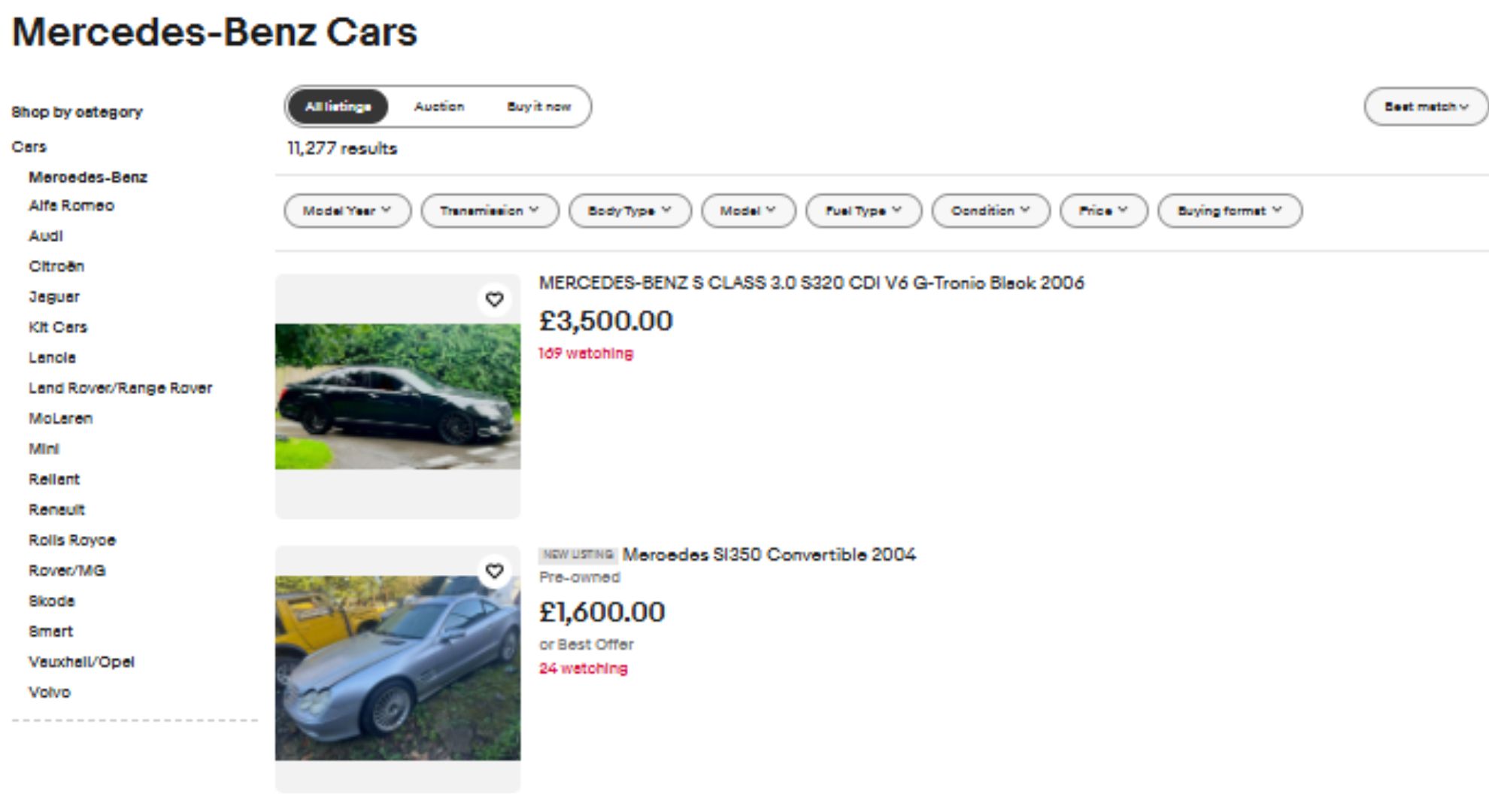
You can sell your car privately on free advertising websites.
Advertising your car offline
There are several offline car advertising options that can be just as effective as their digital counterparts:
-
Noticeboards: Many shops, cafes, pubs, and community buildings allow you to advertise cars on their noticeboards. Some establishments will charge a nominal fee, but others will let you advertise free of charge. Consider placing ads at several locations to maximise reach.
-
Newspapers and print magazines: The print versions of local newspapers and automotive magazines allow readers to publish classified ads to sell used cars.
-
Advertising in your car window: You can place a ‘for sale’ ad with your car’s price and key details on the windscreen when the vehicle is parked on your property. However, if you plan to display the ad whilst parked on a public road, carefully check local council regulations to avoid unexpected fines.
Safety tips
-
If you’re using a car selling website or social app, it’s important to be vigilant and watch out for scams.
-
Don’t allow viewers to photograph sensitive documents. They could use your personal details to commit identity fraud.
-
Ask a friend or family member to accompany you during viewings and test drives. It’s good to have an extra pair of eyes watching out for potential scams.
-
Don’t agree to meet viewers at an unfamiliar location. A car thief could lure you to a remote location to steal your car from you.
-
Never leave the keys in the ignition.
-
Don’t allow anyone to test drive your car unsupervised.
-
Before allowing anyone else to drive your car, check that they have a valid driving licence and insurance. If they don’t, offer to demonstrate the vehicle for them instead.
-
Beware of the ‘dirty oil trick’. Scammers will arrange to see a car in pairs. One will distract the owner, while their accomplice pours oil into the coolant reservoir. As a result, smoke will come out of the engine during the test drive - and the scammers will demand a discount. This nasty trick can also quickly destroy your head gasket, which is expensive to fix, so be extra careful!
Safe payment tips
-
Bank transfer is the most secure payment method.
-
Don’t be pressured into accepting unconventional payment methods such as cryptocurrency or cash apps. They could be used to scam you.
-
We also advise against using PayPal, as this platform doesn’t offer buyer/seller protection for vehicle sales. The buyer could also submit a false claim that the vehicle was not delivered, causing you to lose the cash - and your car.
-
The only payment details you’ll need to give to a buyer are your account number, sort code, and your name.
-
Never tell a buyer your card number, expiry date, or security code. This information could be used to commit fraud.
-
If you plan to take payment in cash, ask to meet the buyer at the bank. The teller can count and verify the cash to ensure the payment is genuine and correct.
-
Whichever payment method you choose, don’t hand over the keys until the funds have reached your account.
2. Selling your car to a dealership
Selling to a dealership is a fast and convenient option for many used car sellers. In most cases, you can sell your car to a dealer for cash or put the proceeds towards the cost of another vehicle via a part-exchange deal.

Pros
-
You may be able to negotiate a good price if you have a car that meets the ‘ approved used’ threshold – or is in high demand.
-
You don’t need to take time out of your schedule to arrange viewings and test drives.
-
Your risk of being scammed is lower than if you sell privately, especially if you do your homework and find a reputable dealer.
Cons
-
Dealers will usually offer you less than your car’s market value. Unlike private sellers, they have to adhere to specific profit margins and cover their showroom’s overhead costs.
-
A part-exchange involves two transactions, which can complicate the process.
-
If you want to change your motor, you’re limited to the cars that are available at the dealership.
-
Each dealer will offer you a different trade-in value. So, you may need to meet and haggle with several until you arrive at a price that you’re happy with.
Timeframe
You may be able to part-exchange your car at a dealership and drive away in a newer model within a couple of hours. If you want to sell your car for cash, some dealers can send the money to your bank on the day of the sale.
Paperwork requirements
Whilst the requirements may vary depending on the dealership’s policy, you’ll often be asked to bring the following documents:
-
V5C logbook.
-
Service history.
-
Receipts for repairs and parts.
-
Warranty documentation (if applicable).
-
Finance settlement letter (if applicable).
-
Your bank details (to facilitate the payment).
-
Original photo ID such as a passport or driving licence.
-
Proof of address (typically a letter dated within the last 9 months).
Don’t forget to bring any accessories such as your car keys and wheel locking nut.
Part-exchange
A part-exchange deal allows you to trade in your old car at a dealership and put its value towards purchasing another one.
The dealer will often deduct value from the price of the vehicle you wish to purchase. Alternatively, they can use it as a deposit for a car finance agreement.
By making a larger deposit, you can shorten the length of the loan and pay less interest - or reduce your monthly payments and spread out the remaining cost over a longer period.
💡Tip: Part-exchange deals can get complicated, because they combine two transactions. Therefore, we recommend getting a quote from the dealer before disclosing your interest in a part-exchange deal. Keeping the two deals separate can help you negotiate a better price for your old car – and save money on your next one!
Selling your car for cash at a dealership
To sell your car at a dealership, contact the dealer, let them know you’re interested in selling, and make an appointment.
We recommend using webuyanycar’s free car valuation tool (or a similar resource) prior to your arrival. Knowing your car’s current market value will give you a clear view of what is (and isn’t) a good offer.
When you arrive, the dealer will evaluate your car and give you a quote. From here, you can decide whether you’re happy to accept the offer. There may be scope to negotiate and secure a slightly better deal.
If you’re happy to sell, you’ll be asked to sign the paperwork. Most dealers will send the cash to your bank reasonably quickly (sometimes on the day of the sale).
Safety tips
-
Remember, there’s no obligation to sell to a dealer. If you’re not happy with their price or conditions, you can walk away at any time.
-
It’s your responsibility to notify the DVLA of the sale. You should always do this yourself - even if the dealer offers to do so on your behalf. If they fail to update the DVLA, you could be held liable for any motoring fines and penalties the next owner incurs.
3. Selling your car at auction
Car auctions take place online and in person. Selling your car at auction is worth considering if you have a rare, valuable, or collectable model. Selling at a specialised auction can increase your chances of getting a favourable price, as your car will be displayed before an audience of relevant enthusiasts.
If your car has been written off, you may have difficulties selling it privately, but you could have more success selling it at a salvage auction.
When selling at auction, you’ll usually pay an entrance fee to list your car. If you sell your car, most auction houses will also charge commission on the sale.

Pros
-
Rare, valuable, and collectable cars often sell for good prices at auction.
-
If your car fits this description and you want to maximise your profit, selling at an auction could even be a better option than selling privately.
-
A specialised auction is likely to have numerous potential buyers under one roof, which could help you get a favourable price.
Cons
-
There are various costs to contend with, including entry fees, commission to the auction house if you sell your car (often around 10% or more) - and storage fees (if you fail to sell and wish to store your car between auctions).
-
There’s no guarantee your car will sell – or that a bidder will match your starting price.
-
Entry fees, travel and storage costs will eat into your profits.
Timeframe
If you sell your car at auction, you’ll typically get paid within 1-2 days (minus any auction fees).
Paperwork requirements
The specific paperwork required to sell a car at auction will vary depending on the organiser’s policy. However, the following documents are often requested:
-
V5C logbook.
-
The owner’s manual.
-
Garage receipts.
-
Service history.
-
Finance settlement letter (if applicable).
-
Any other relevant documentation.
The organiser may also request accessories such as the keys and wheel locking nut. Remember, a car with a comprehensive set of paperwork and accessories is likely to raise more cash at auction.
4. Selling your car for scrap
Selling for scrap is a convenient way to dispense with your car if it’s a non-runner or has been written off. You can scrap your car at a scrapyard, also known as an authorised treatment facility (ATF).

Pros
-
Scrapping your car is a convenient way to get rid of your car when it reaches the end of its useful life.
-
You’re guaranteed to get cash for scrapping your car (but potentially less than with other selling methods).
-
If you have a high-polluting car, scrapping it will reduce your carbon footprint.
-
Most of your car can be recycled.
-
ATFs follow stringent guidelines to ensure any hazardous materials are disposed of safely.
Cons
-
You could potentially raise more cash for your ‘scrap’ car by selling it to a car buying service or stripping out valuable parts to sell individually.
-
You’ll be left without a car. If your vehicle has only sustained minor damage, it may be more cost-effective to have it repaired to roadworthy condition.
-
If your car is repairable, you may get a better financial return from selling it privately, to a dealer or a car buying service – even if you don’t repair it yourself first.
Timeframe
It should take just a few minutes to arrange for your car to be scrapped at an ATF online or over the phone.
Depending on their schedule, the ATF may be able to collect it for you within a few days. However, a local vehicle transport service will probably be able to deliver your car to the yard sooner.
Paperwork requirements
Here are the documents you need to scrap your car:
-
V5C logbook.
-
Photo ID.
-
Proof of address.
It is possible to scrap a car without a V5C logbook but having this document will make the process easier.
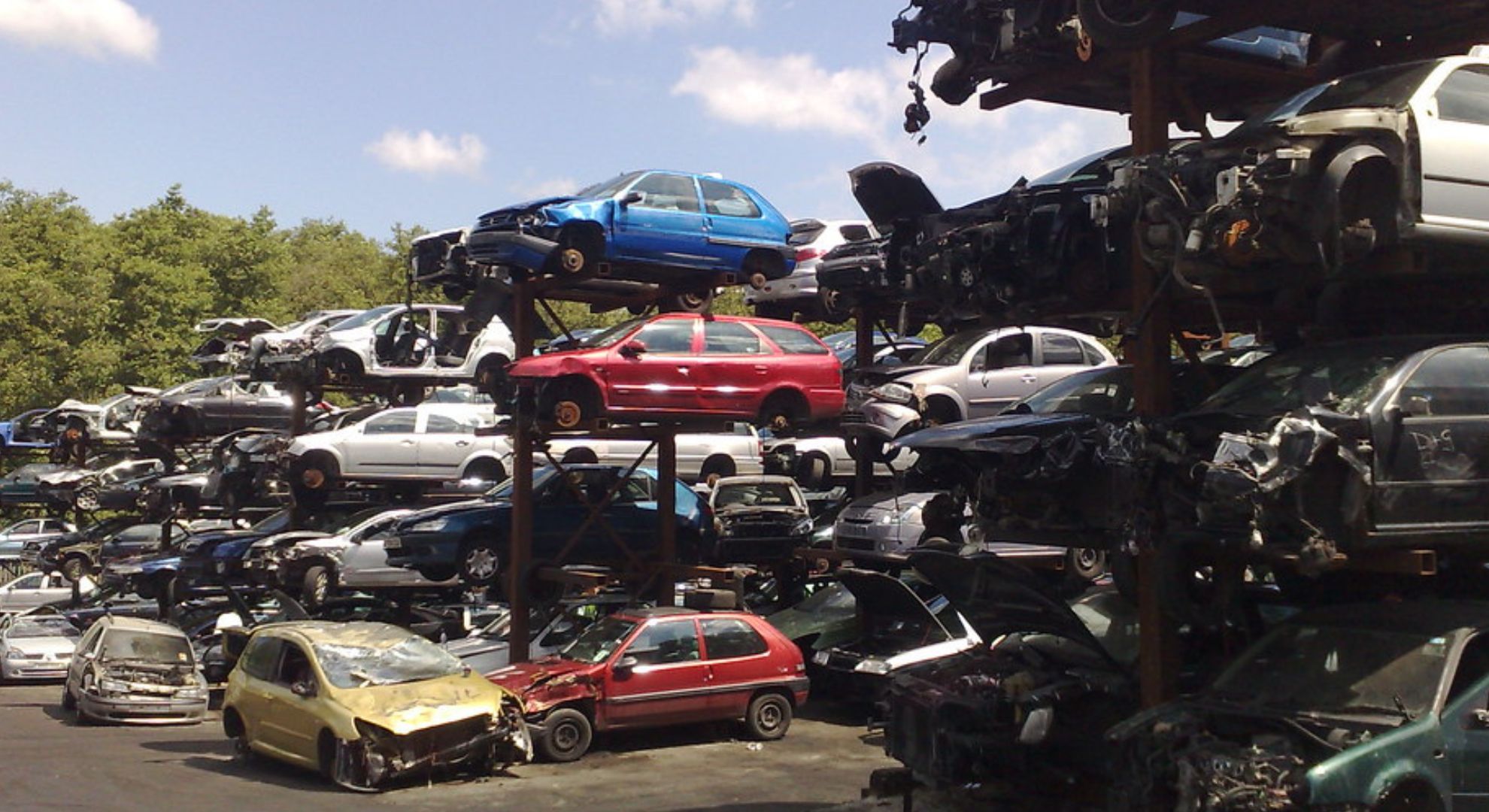
You can easily scrap your car, but you may not get the best price.
Car scrappage schemes
-
Renault’s ‘New for Old Scheme’ allows you to get a discount on a brand-new Renault model when you trade in your old passenger or light commercial vehicle. This offer is available at participating dealerships.
-
The Energy Saving Trust is offering grants of up to £3,000 for the safe disposal of high-polluting cars in certain areas of Scotland.
-
If you live within 20km of any Scottish Low Emission Zone (LEZ) and own a petrol car that doesn’t meet Euro 4 standards – or a diesel car that doesn’t meet Euro 6, you are eligible to apply for this scheme.
-
After over 54,000 successful applications, the Mayor of London’s ULEZ scrappage scheme is now closed.
-
The scheme offered grants for scrapping high-polluting vehicles to those residing within the Ultra Low Emission Zone (ULEZ) (i.e. the City of London and London’s 32 boroughs).
Stripping a car for parts
All cars, excluding Category A write-offs can be salvaged for parts. If your car has significant mechanical or structural damage, but certain valuable parts are intact, removing them and selling them separately can help you to recover some of your losses.
Here are some of the most valuable car parts:
- Airbags.
- Air conditioning or climate control system.
- Battery.
- Catalytic converter.
- Doors.
- Electrical components.
- Engine.
- GPS system.
- Mirrors.
- Seats (if in good condition).
- Windows.
Stripping your car for parts can help you raise more money than you’d get from scrapping it alone. However, the process is more time consuming and removing certain parts requires mechanical skill.
Scrap car buying websites
As an alternative to a traditional scrapyard, you can sell your ‘scrap’ car through many car buying services, including webuyanycar – and various scrap car buying websites.
With webuyanycar, you can get a valuation from the comfort of your own home – then sell your ‘scrap’ car at any of our 500+ UK locations.
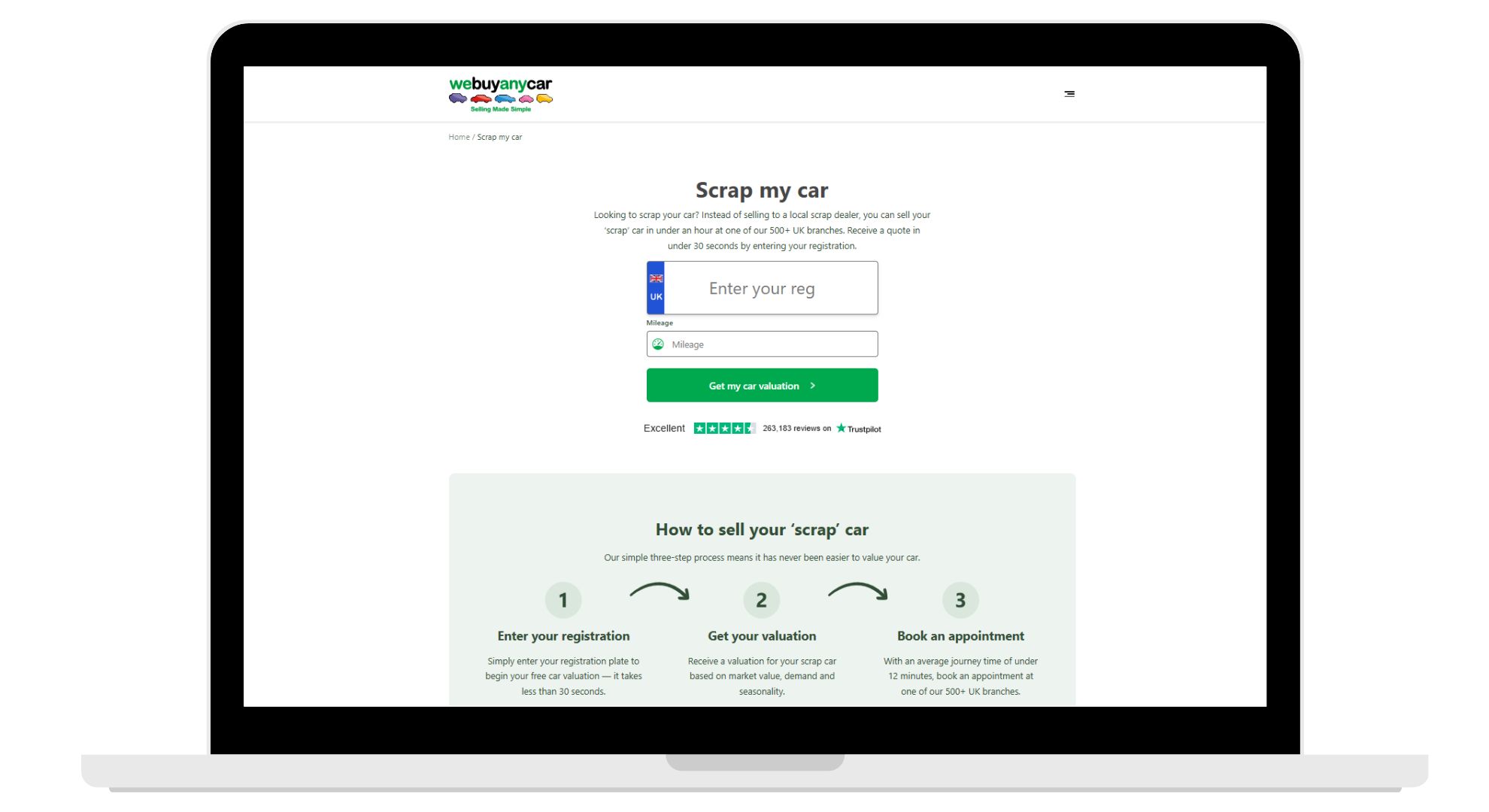
We will buy your scrap car.
Safety tips
Before scrapping your car, you should check that your chosen scrap dealer is licensed by the Government by visiting the Vehicle Recyclers Association website.
Scrap dealers cannot legally pay for scrap metal in cash. Any payments should be made to you by cheque or bank transfer.
5. Selling to webuyanycar
Webuyanycar offers a quick, hassle-free way to sell your car. Want to sell your car to us? Here’s how it works:
-
Get your free valuation: Enter your reg number and mileage into our free car valuation tool to get a quote in under 30 seconds.
-
Book your appointment: Select a convenient date and time, then book an appointment at any of our 500+ UK locations.
-
Sell your car: Drive to your appointment and the buyer will confirm your valuation. Happy to sell? We’ll help with the paperwork and send the money to your bank.
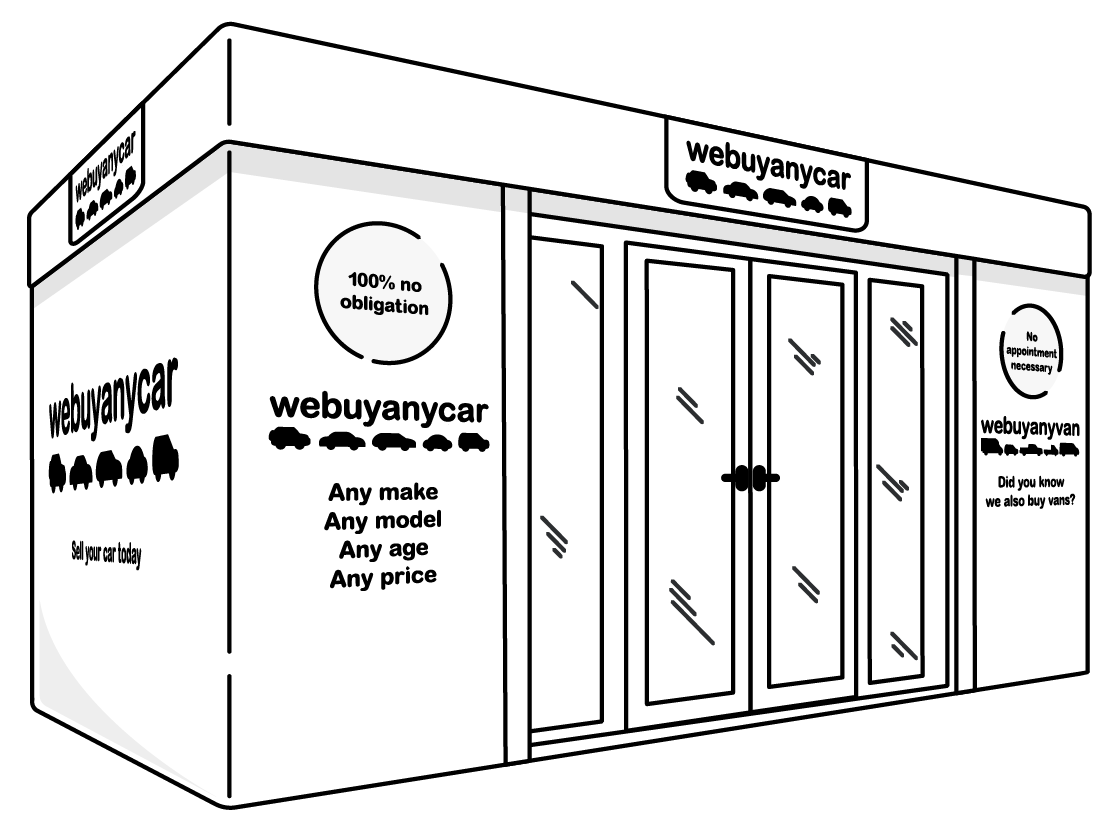
Pros
-
webuyanycar is the UK’s most popular car buying service with more than 4 million customers served!
-
We offer a simple, stress-free service with an ‘Excellent’ Trustpilot score from over 250,000 consumer reviews.
-
You’ll benefit from a guaranteed sale.
-
Our valuations are completely free and based on real-time market data.
-
We have over 500 locations across England, Scotland, Wales, and Northern Ireland – and the average drive time to the nearest branch is just 11 minutes!
-
Our buyers can settle any outstanding finance on your behalf. (Simply bring an in-date settlement letter to your appointment.)
-
We can beat most part-exchange offers.
Cons
-
In some cases, you could get more cash by selling privately.
-
webuyanycar does not offer a collection service. So, if your car is not roadworthy, you’ll need to hire a vehicle transport service to take it to your appointment.
Timeframe
Our average appointment time is 20 minutes – and the average timeframe from quote to sale is less than an hour.
With webuyanycar, you’ll benefit from a guaranteed sale. We can buy your car regardless of its age and condition – and you won’t have to meet dealers or punters who may not be serious about buying.
With our standard payment option, you’ll get paid within 4 working days. However, if you want to get the cash faster, you can take advantage of our Immediate Payment option, which clears within 15 minutes (an additional fee will apply).
Paperwork requirements
To sell your car to webuyanycar, you’ll need to bring the following documents to your appointment:
-
V5C logbook.
-
Original photo ID (passport or driving licence).
-
Proof of address (dated within the last 9 months).
-
Your bank details.
-
Service history documents (if applicable).
-
Finance settlement letter (if applicable).
You’ll also need to bring at least one set of keys – and any extras such as the wheel locking nut.
Safety tips
-
Plan your visit carefully. Account for local road and traffic conditions to ensure a stress-free journey.
-
If your car is not roadworthy, please contact a local vehicle transport service. They should be able to safely tow your vehicle to your appointment.
-
If you are leaving your car with us, please make sure you arrange transport for the journey home.
-
You are welcome to use the phone at your local branch office to arrange a taxi.
-
Our staff can also advise you on local transport links.
What is the best car selling method for profit?
If you want to get as much cash as possible for your motor, selling privately is usually the best option.
However, you’ll have to invest a lot of your time advertising your car, scheduling viewings, and facilitating test drives. Private selling also increases your risk of encountering car buying scams.
Please note: If you have a rare, valuable, or collectable model, selling it at auction could net you the best return.
For more detailed guidance, see our article “how to increase resale value of your car”.
What is the fastest car selling method?
webuyanycar offers a fast, convenient way to sell your car with a guaranteed sale. The average time from quote to sale is less than an hour.
What is the safest car selling method?
A reputable car buying service or dealership will provide a safe, secure selling environment.
If you’re unfamiliar with a particular dealer or trader, it’s worth reviewing feedback from past customers on platforms such as Google Maps, Trustpilot, and Yelp before committing.
For more detailed guidance, see our article ‘how to safety sell your car’.
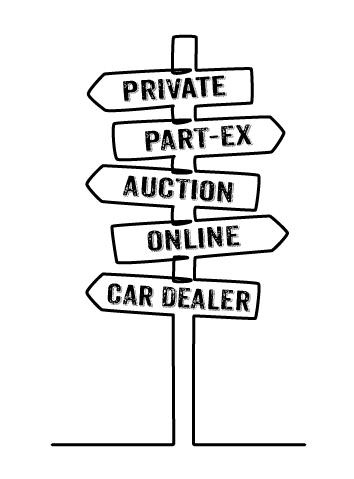
Car selling methods compared: Which is best for me?
webuyanycar |
Selling privately |
Dealerships |
Auctions |
Scrapyards |
|
|---|---|---|---|---|---|
| Average timeframe | ⚡Under an hour from quote to sale. | 🐌34.5 days. | ⚡Usually paid within a day. | ⚡Usually paid within 1-2 days. | ⚡Usually paid within 1-2 days. |
| Safety | 🔒A safe, secure car buying service. | 🔓Increased risk of fraud and scams. | 🔒Most dealerships are safe and reputable. | 🔒Most auctions are genuine and trustworthy. | 🔒Safe and reliable, if fully authorised. |
| Difficulty | 🟢Simple. You just need to bring key paperwork and accessories. | 🔴Can be tricky if you’re dealing with multiple viewers and test drives. | 🟢Simple, providing the dealer agrees to buy your car. | 🔴Can be tricky if you’re unfamiliar with the process. | 🟢Simple. Just bring your car to the yard witha few key documents. |
| Costs | 🟡 Transaction fees and optional quick payment charges may apply. | 🟡You may pay petrol costs and advertising fees. | 🟢No fees usually apply – but the price may be lower. | 🟡Entrance fees, commission, and other costs may apply. | 🟢No fees for scrapping but transport costs may apply. |
| Potential payment | 🟢Competitive valuations based on market data. | 🟢You may get the most cash selling privately. | 🟡Often below market value when selling or part-exchanging. | 🟢Rare and valuable cars may fetch the most cash. | 🔴Scrap dealers usually offer the smallest return. |
| Guaranteed sale? | ✅ | ❌ | ❌ | ❌ | ✅ |
Still looking for more information? Here are 13 tips for selling your car.
Quick links:
- 1. Selling your car privately
- 2. Selling your car to a dealership
- 3. Selling your car at auction
- 4. Selling your car for scrap
- 5. Selling to webuyanycar
- What is the best car selling method for profit?
- What is the fastest car selling method?
- What is the safest car selling method?
- Car selling methods compared: Which is best for me?







